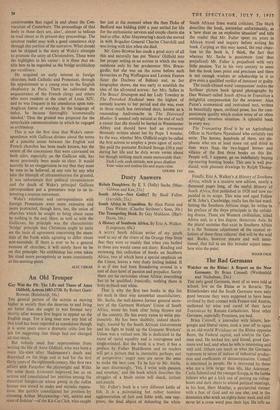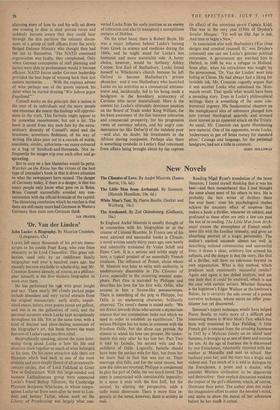The Bad Germans
THE only good Germans, most of us were told at school, live on the Rhine or in Bavaria. The Rhinelanders and the South Germans were only good because they were supposed to have been civilised by their contact with France and Austria, mellowed by wine and cured of their furor Teutonicus by Roman Catholicism. Most other Germans, especially Prussians, are bad.
Brian Connell, a journalist with leisure, lan- guages and liberal views, took a year off to squat in an old-world Weinhaus on the Rhine opposite Bonn, the Federal capital, and analyse the Ger- man soul. He looked for, and found, good Ger- mans and bad, and what• he tells is interesting and Well told. Others can teach us what the Germans represent in terms of indices of industrial produc- tion and coefficients of democratisation. Connell is interested in people. He is interested by those who are a little larger than life, like Adenauer, Carlo Schmid and the younger Krupp, in the feeble fellows who get a kick out of putting on riding- boots and dark shirts to attend political meetings, in his host, Herr Mueller, a patriarchal vintner with a fear of God and no one else, and in the domestics who work an eighty-hour week and still never let a cross word pass their lips. He tells an alarming story of how he and his wife sat down one evening to dine in their private room and suddenly became aware that they could hear through the thin partition the intimate discus- sions of a group of staff officers from the newly fledged Defence Ministry who thought they had the inn to themselves. 'The NATO command organisation was faulty, they complained. Only when German conceptions of staff planning and tactics were able to predominate would it become efficient. NATO forces under German leadership provided the best hope of winning back their lost eastern territories. . . . With the copious advent of wine perhaps one of the guests mistook his dates when he started droning "Wir fahren gegen Engelland."'
Connell works on the principle that a nation is the sum of its individuals and the more people one examines the nearer the findings will approxi- mate to the truth. This formula might appear to be somewhat monotonous; but not a bit. The book is saved from any such fate by the extra- ordinary diversity of Connell's mind and the brashness, sometimes flashiness, of his way of writing. His ideas pour out in a cascade of words, anecdotes, similes, aphorisms—as many-coloured as a bag of hundreds-and-thousands. Not in- frequently his images trip over each other and go sprawling.
But to carp on a few blemishes would be petty. Watcher on the Rhine has the virtues of the best type of journalist's book in that it draws attention to what the newspapers have missed. The danger of Germany today, if there is a danger, is that too many people only know what goes on in Bonn. Brian Connell successfully avoided any con- tamination with the official bromide of the capital. The disturbing conclusion which he reaches is that there arc still many more bad Germans in Western Germany than most non-Germans think.
IAN FRASER















































 Previous page
Previous page